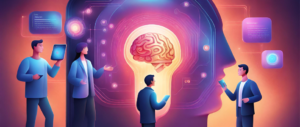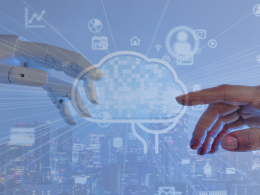Have you ever wondered how marketing strategies could become so intelligent that they seem to anticipate your every need?
In today’s rapidly evolving digital era, businesses are embracing the power of artificial intelligence (AI) to unlock new dimensions of customer engagement and drive exceptional results. AI marketing has emerged as a game-changer, transforming the way companies connect with their audience and deliver personalized experiences.
Join us as we dive into the fascinating world of AI marketing, exploring its capabilities, benefits, and exciting possibilities for shaping the future of digital marketing in 2024 and beyond.
According to McKinsey, global marketing and sales teams can use AI to unlock up to $6 trillion in annual value. In fact, in the same report, 74% of marketing and sales respondents reported a revenue increase with AI adoption.
Types of AI Marketing
Traditional marketing methods often rely on guesswork and assumptions, but AI marketing takes a giant leap forward by leveraging data-driven insights and advanced algorithms.
It empowers marketers to make data-backed decisions, gain deeper customer understanding, and execute targeted campaigns that deliver tangible results.
1. Personalization Engines
AI-powered personalization engines analyze vast amounts of customer data to deliver tailored experiences. From recommending products based on individual preferences to customizing content and offers, personalization engines enhance customer engagement and foster loyalty.
2. Predictive Analytics
AI algorithms analyze historical data to anticipate customer needs and behaviors. By identifying patterns and trends, marketers can proactively engage with customers, predict buying behavior, and optimize their marketing strategies for maximum impact.
3. Chatbots and Virtual Assistants
AI-driven chatbots and virtual assistants provide instant customer support, answering queries and guiding customers through their journey. These intelligent virtual agents improve customer experience by offering prompt responses and personalized assistance.
4. Recommendation Systems
AI-powered recommendation systems analyze customer data to provide personalized product recommendations. By understanding customer preferences and purchase history, these systems drive cross-selling and upselling opportunities, boosting sales and customer satisfaction.
5. Automated Campaign Management
AI automates various aspects of campaign management, including audience targeting, ad placement optimization, and performance tracking. Marketers can leverage AI to streamline and optimize their campaigns, ensuring maximum reach and effectiveness.
AI Marketing Use Cases

1. Dynamic Pricing
AI algorithms analyze market trends, competitor pricing, and customer behavior to optimize pricing strategies in real-time. This helps businesses maximize revenue and stay competitive.
2. Content Generation
AI can generate personalized content, such as product descriptions, blog articles, and social media posts. This streamlines content creation processes and ensures consistent quality.
3. Customer Segmentation
AI helps segment customers based on various factors, such as demographics, behavior, and preferences. This allows marketers to create targeted campaigns tailored to specific customer segments.
4. Sentiment Analysis
AI-powered sentiment analysis tools analyze social media data and customer feedback to gauge sentiment towards a brand or product. This helps businesses understand customer perceptions and adjust their strategies accordingly.
Benefits of AI Marketing

1. Enhanced Customer Experience
AI enables personalized and tailored experiences, resulting in improved customer satisfaction and engagement.
2. Increased Efficiency and Productivity
AI automates repetitive tasks, freeing up marketers’ time to focus on strategy and creativity.
3. Improved Decision Making
AI provides data-driven insights and predictive analytics, empowering marketers to make informed decisions and optimize campaigns.
4. Higher ROI
AI-driven personalization and optimization result in more targeted and effective campaigns, leading to higher returns on investment.
Challenges in AI Marketing
1. Data Quality and Privacy
AI relies on quality data to deliver accurate insights. Ensuring data integrity and protecting customer privacy are critical challenges that marketers must address.
2. Talent and Expertise
Implementing AI marketing requires skilled professionals who can leverage AI tools and technologies effectively. Acquiring and retaining talent in this field can be a challenge.
3. Ethical Considerations
AI marketing raises ethical concerns regarding data usage, personalization, and algorithmic biases. Marketers must navigate these ethical challenges to build trust with their customers.
Notable Examples of AI Marketing
1. Netflix
The popular streaming platform leverages AI algorithms to personalize user recommendations. By analyzing viewing history, genre preferences, and user behavior, Netflix suggests content tailored to each viewer’s tastes, increasing user engagement and retention.
2. Amazon
The e-commerce giant utilizes AI-powered recommendation systems to suggest products to customers based on their browsing and purchase history. These personalized recommendations drive cross-selling and upselling, enhancing the overall shopping experience.
3. Spotify
The music streaming platform employs AI algorithms to curate personalized playlists for its users. By analyzing listening habits, genre preferences, and user feedback, Spotify creates customized playlists that cater to individual music tastes, fostering user loyalty.
4. Sephora
The cosmetics retailer uses AI technology to provide virtual makeup try-on experiences. Through augmented reality (AR) and facial recognition, customers can virtually test different makeup products and shades, helping them make informed purchasing decisions.
5. Starbucks
The coffee giant utilizes AI algorithms to enhance its mobile app and rewards program. AI-powered algorithms analyze customer data to offer personalized recommendations, promotions, and discounts, improving customer engagement and loyalty.
Predictions and Trends in AI Marketing
1. Hyper-Personalization
AI will enable even more precise and tailored marketing experiences. By analyzing vast amounts of customer data, AI algorithms will deliver hyper-personalized content, offers, and recommendations, further enhancing customer engagement and satisfaction.
2. Voice Search Optimization
With the rise of voice-activated virtual assistants like Siri, Alexa, and Google Assistant, optimizing marketing strategies for voice search will become crucial. AI-powered voice recognition and natural language processing will play a significant role in understanding user queries and delivering relevant results.
3. Advanced Customer Segmentation
AI will continue to refine customer segmentation by analyzing intricate patterns and behaviors. Marketers can leverage AI algorithms to identify micro-segments within their target audience, enabling highly targeted campaigns and personalized messaging.
4. AI-Powered Content Creation
AI will assist marketers in content creation by generating automated content, writing personalized emails, and optimizing social media posts. Natural language generation algorithms will evolve, allowing businesses to streamline content production while maintaining quality and relevance.
5. Time Data Analysis
AI algorithms will enable real-time data analysis, allowing marketers to make timely decisions and optimize campaigns on the fly. By monitoring customer behavior and campaign performance in real-time, businesses can respond quickly to market trends and changing customer preferences.
6. Enhanced Customer Support
AI-powered chatbots and virtual assistants will continue to evolve, providing more seamless and intelligent customer support. Natural language processing and machine learning algorithms will enable chatbots to understand complex queries, provide accurate information, and resolve customer issues efficiently.
7. AI-Driven Predictive Analytics
Predictive analytics powered by AI will become increasingly sophisticated, enabling marketers to forecast customer behavior, predict market trends, and optimize marketing strategies for maximum impact. This will help businesses stay ahead of the competition and make data-driven decisions.
8. Ethical AI Marketing
As AI becomes more prevalent in marketing, there will be a greater emphasis on ethical considerations. Marketers will need to address concerns regarding data privacy, algorithmic bias, and transparency to build trust and maintain a positive brand image.
Embrace AI marketing and unleash its potential to transform your digital strategies into powerful and impactful experiences for your audience. The future of marketing is here, where data-driven insights and machine learning redefine success.
Join the AI marketing revolution and stay ahead in the ever-evolving digital landscape.
 Pin
PinEmbark on your data-driven journey today with Accredian! Explore our comprehensive collection of Data Science resources and kickstart a rewarding career in this dynamic field.
Let’s transform your data-driven dreams into reality! Reach out to us for any queries or feedback, and we’ll be delighted to assist you on your path to success.






